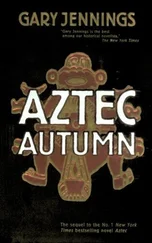Gary Jennings - Aztec
Здесь есть возможность читать онлайн «Gary Jennings - Aztec» весь текст электронной книги совершенно бесплатно (целиком полную версию без сокращений). В некоторых случаях можно слушать аудио, скачать через торрент в формате fb2 и присутствует краткое содержание. Жанр: Старинная литература, на английском языке. Описание произведения, (предисловие) а так же отзывы посетителей доступны на портале библиотеки ЛибКат.
- Название:Aztec
- Автор:
- Жанр:
- Год:неизвестен
- ISBN:нет данных
- Рейтинг книги:4 / 5. Голосов: 1
-
Избранное:Добавить в избранное
- Отзывы:
-
Ваша оценка:
- 80
- 1
- 2
- 3
- 4
- 5
Aztec: краткое содержание, описание и аннотация
Предлагаем к чтению аннотацию, описание, краткое содержание или предисловие (зависит от того, что написал сам автор книги «Aztec»). Если вы не нашли необходимую информацию о книге — напишите в комментариях, мы постараемся отыскать её.
"Anyone who reads, anyone who still lusts for adventure or that book you can't put down, will glory in Aztec."--Los Angeles Times
Aztec
Aztec
Aztec — читать онлайн бесплатно полную книгу (весь текст) целиком
Ниже представлен текст книги, разбитый по страницам. Система сохранения места последней прочитанной страницы, позволяет с удобством читать онлайн бесплатно книгу «Aztec», без необходимости каждый раз заново искать на чём Вы остановились. Поставьте закладку, и сможете в любой момент перейти на страницу, на которой закончили чтение.
Интервал:
Закладка:
Our father cleared his throat and said, "I care not so much for the -tzin to our names, but I care less for discourtesy and infamy. To refuse a nobleman any request—especially to decline the honor Pactli confers by asking our daughter's hand—would be an insult to him, a disgracing of ourselves, that we could never live down. If we were let to live at all, we would have to leave Xaltócan."
"No, not the rest of you." Tzitzi spoke for the first time, and firmly. "I will leave. If that degenerate beast Pactli... Do not raise your hand to me, Mother. I am a woman grown, and I will strike you back."
"You are my daughter and this is my house!" shouted our mother.
"Children, what has come over you?" pleaded our father.
"I say only this," Tzitzi went on. "If Pactli demands me, and you accede, not you or he will ever see me again. I will leave the island forever. If I cannot borrow or steal an acáli, I will swim. If I cannot reach the mainland, I will drown. Not Pactli or any other man will ever touch me, except a man I can give myself to."
"On all of Xaltócan—" our mother sputtered. "No other daughter so ungrateful, so disobedient and defiant, so—"
This time she was silenced by our father, who said, and said solemnly, "Tzitzitlini, if your unfilial words had been heard outside these walls, not even I could pardon you or avert your due punishment. You would be stripped and beaten and your head shaved. Our neighbors would do it if I did not, as an example to their own children."
"I am sorry, father," she said in a level voice. "You must choose. An undutiful daughter or none."
"I thank the gods I need not choose tonight. As your mother remarked, it will be a few years yet before the young Lord Joy can marry. So let us speak of it no more now, in anger or otherwise. Many things may happen between now and then."
Our father was right: many things might happen. I did not know if Tzitzi had meant anything she said, and I had no chance to ask her that night or the next day. We dared no more than to exchange a worried and yearning glance from time to time. But, whether or not she held to her resolve, the prospect was desolating. If she fled from Pactli, I should lose her. If she succumbed and married him, I should lose her. If she went to his bed, she knew the arts of convincing him that she was virgin. But if, before then, my own behavior made Pactli suspect that another man had known her first—and me of all men—his rage would be monumental, his revenge inconceivable. Whatever the hideous manner he chose for slaying us, Tzitzi and I would have lost each other.
Ayya, many things did happen, and one of them was this. When I went to The House of Building Strength at the next day's dusk, I found my name and Pactli's on Blood Glutton's roster, as if it had been ordained by some ironic god. And when our squad got to the appointed patch of trees, Offal of the Gods was already there, already naked, sprawled, and ready. To the astonishment of Pactli and our other companions, I immediately ripped off my loincloth and flung myself upon her.
I did it as clumsily as I could, a performance calculated to make the other boys believe it was my first, and a performance that probably gave the slut as little pleasure as it gave me. When I judged it had gone on long enough, I prepared to disengage, but then the revulsion got the better of me, and I spewed vomit all over her face and naked body. The boys roared and rolled on the ground with laughter. Even the wretch Offal of the Gods was capable of recognizing the insult. She gathered up her garments, and she clutched them to her nakedness, and she ran away, and she never came back.
* * *
Not long after that incident, four other things of note occurred in rather rapid succession. At least, that is how I remember them happening.
It happened that our Uey-Tlatoani Axayácatl died—very young, from the effects of wounds he had received in the battles against the Purémpecha—and his brother Tixoc, Other Face, assumed the throne of Tenochtítlan.
It happened that I, along with Chimali and Tlatli, completed what schooling was afforded on Xaltócan. I was now regarded as "educated."
It happened that our island's governor sent a messenger to our house one evening to summon me immediately to his palace.
And it happened that, at last, I was parted from Tzitzitlini, my sister and my love.
But I had best recount those occurrences in more detail, and in the order of their happening.
The change of rulers did not much affect the lives of us in the provinces. Indeed, even in Tenochtítlan, little was later remembered of Tixoc's reign except that, like his two predecessors, he continued work on the still-rising Great Pyramid in The Heart of the One World. And Tixoc added an architectural touch of his own to the plaza. He had stonemasons hew and carve the Battle Stone, a massive flat cylinder of volcanic rock which lay like a stack of immense tortillas between the unfinished pyramid and the Sun Stone's pedestal site. The Battle Stone was nearly as high as a man and about four strides across its diameter. Around the rim were low-relief carvings of Mexíca warriors. Tixoc prominent among them, engaged in combat and in subduing captives. The flat round top of the stone was the platform for a kind of public dueling, in which, a long time later, and in an unusual way, I would have occasion to participate.
Of rather more immediate concern to me, at that time, was the end of my formal schooling. Not being of the nobility, I was of course not entitled to go on to a calmécac of higher learning. And my record as Malinqui the Kink in one of our schools, and as Poyautla the Fogbound in the other, had hardly been of a nature to make any of the higher schools on the mainland invite me to attend at no cost.
What particularly embittered me was that, while I hungered in vain for the chance to learn more than the trivial knowledge our telpochcaltin could teach, my friends Chimali and Tlatli, who cared not a little finger for any further formal learning, did each get an invitation from separate calmécactin—and both of those in Tenochtítlan, my own dream destination. During their years in Xaltócan's House of Building Strength they had distinguished themselves as tlachtli players and as cub warriors. Though an elegant nobleman might have smiled at the "graces" the two boys had absorbed from The House of Learning Manners, they had nevertheless shone there too, by designing original costumes and settings for the ceremonies performed on festival days.
"It is too bad you cannot come with us, Mole," said Tlatli, sounding sincere enough but no whit less happy at his own good fortune. "You could attend all the dull schoolroom classes, and leave us free for our studio work."
Under the terms of their acceptance, both boys would, besides learning from the calmécac priests, also be apprenticed out to Tenochtítlan artists: Tlatli to a master sculptor, Chimali to a master painter. I was sure that neither of them would pay much heed to the lessons in history, reading, writing, counting, and such, the very things I ached for most. Anyway, before they departed, Chimali said, "Here is a good-bye gift for you, Mole. All my paints and reeds and brushes. I will have better ones in the city, and you may find them useful in your writing practice."
Yes, I was still pursuing my untutored study in the arts of reading and writing, though my ever becoming a word knower now seemed hopelessly remote, and my moving to Tenochtítlan a dream that would forever come untrue. My father had likewise despaired of my ever becoming a dedicated quarrier, and I was now too old to serve only to sit at the empty pit and shoo away animals. So, for some while past, I had been earning my keep and contributing to our family's support by working as a common farmboy.
Читать дальшеИнтервал:
Закладка:
Похожие книги на «Aztec»
Представляем Вашему вниманию похожие книги на «Aztec» списком для выбора. Мы отобрали схожую по названию и смыслу литературу в надежде предоставить читателям больше вариантов отыскать новые, интересные, ещё непрочитанные произведения.
Обсуждение, отзывы о книге «Aztec» и просто собственные мнения читателей. Оставьте ваши комментарии, напишите, что Вы думаете о произведении, его смысле или главных героях. Укажите что конкретно понравилось, а что нет, и почему Вы так считаете.











